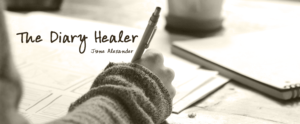My friend the diary (part 3): Using your diary as a “get to know me” power tool
My friend the diary (part 3): Using your diary as a “get to know me” power tool

Using a diary as an agent for recovery and change
by June Alexander
When I began recovery from a long-term eating disorder, my diary became an agent for change – supporting “me” rather than my illness. For example, it became a place to explore and reflect on painful experiences from long ago, that the eating disorder had helped me to avoid and suppress. Secrets laced with shame and stigma were progressively confronted and addressed in a way that dissipated the pain and fear; as well as a testimony to the past, my diary became a tool with which to cope with present-day events that triggered eating disorder thoughts. The diary provided a go-between, between my treatment team and me. Re-training thoughts, so true thoughts could dominate illness thoughts, took many years, and much repetition on the diary pages but gradually, self-awareness grew!
A breakthrough came in my 30s, when a psychiatrist saw “me” beyond the entrenched layers of illness, and gained my trust. Understanding the value of narrative medicine, he listened and encouraged written communication. My trust in the diary became a tool with which to establish a trusting relationship, a vital first step in reconnecting with, and trusting, self. With guidance, the diary became a practice ground for developing new thoughts and behaviors that were supportive of authentic me.
Nullifying eating disorder thoughts
The task of retraining thoughts, so true thoughts dominate illness thoughts, is a tough challenge but the reward is priceless – the freedom to live a full life. This was my experience.
Through sharing thoughts, that had previously been confined to my diary, with my therapist, I learned how to recognise and deflect the eating disorder thoughts, and began using the diary increasingly as a tool to help connect more with, and strengthen, my true self.
For instance, the eating disorder could catapult a slight criticism into a major catastrophe. Thoughts would scream, “you are useless.” But now, when feeling criticized or things are not going as planned, rather than default to an eating disorder thought and behavior, I could write in my diary about how I was feeling and why, why, why, releasing the pressure of the moment, until thoughts slow and I could see the situation more clearly.
Self-abuse gradually declined as I progressively developed healthy thought and behavioural patterns. This took much persistence, for the illness had been part of my life for many years. But hey, I got there, and so can you.
Writing can help put a pause in panic
When confused or afraid, writing can help you to focus on facts, challenge self-doubt and sort feelings and thoughts. For example:
When a friend does not call as expected, Kate opens her diary and writes:
“… my friend has not kept his word to call at 8pm…”
Depending on the type of ED, thoughts pour on to the page:
” … he does not care about me; I fear he cares about X more…because I am worthless; I am fat; I must do 500 push-ups, must not eat dinner/I am a pig/will binge and stuff myself stupid….”
However, with guidance, Kate can use this experience to learn how to still her mind next time and create a pause in ED’s galloping, negative thoughts:
” … I was looking forward to the phone call so I feel disappointed and a little afraid; however there may be a good reason – he may be working late, or delayed in traffic. I will wait 10 minutes and then try to call him or send an SMS because action beats anxiety. To occupy my mind I will write in my diary, and do part of a puzzle. I will not self-harm because I know that won’t help solve anything.”
Sharing your diary – how it can help
Sometimes, persuading a therapist you are, indeed, ill is the first challenge in accessing treatment for an eating disorder. Eve, through sharing her diary with the psychiatrist she had just met, began to receive essential care.
Eve, through sharing her diary with the psychiatrist she had just met, began to receive care that would save her life.
“From reading my diary he realized how sick I really was and made decisions that might have saved my life because of how suicidal I was. Later on when things weren’t quite so desperate … reading his words helped me to remember I wasn’t alone and there were people who cared.”
During acute hospital admissions, the diary gave Eve something to do and, importantly, it continued its role of translator and informant:
“It was great to have my psychiatrist read and challenge thoughts expressed there because during the week, until I saw him next, I was left with people I didn’t trust.
The diary and my psychiatrist’s next visit was all the hope I had to cling to.”
– Excerpts from Eve’s diary in The Diary Healer
Eve’s diary served as a personal advocate in her diagnosis. Through sharing excerpts, her diary became her voice and saved her having to re-tell her story over and over to doctor upon doctor, which could be exhausting and distressing. Her diary entries also preserved the accuracy of her story.
A difference between a personal diary and a food diary
Sharing written work with treatment team members gives them opportunity to read, absorb, contemplate and translate back to the patient.
However, if thoughts and feelings are masked, and entries tailored, due to fear someone not trusted might read the work, the diary may lose ability to hold the writer accountable to self. Feeling safe to discuss potentially triggering matters in the diary without restraint is vital.
Andrea’s solution was to share a food diary, an instrumental part of her therapy, with her treatment team, but importantly her personal diary remained private.
Andrea writes:
“My personal diary was just for me. Knowing I would have to share all of my diary-recorded thoughts with my therapist might have led to self-censorship.
A food diary is helpful when used in a self-affirming way, for example, to reinforce meal plan strategies. However, logging food details can be risk-prone to eating disorder manipulation. Remember, the eating disorder loves self-defeating rules and secrets. To avoid this risk a food diary is best used openly with professional guidance.”
– Andrea, in The Diary Healer
A diary can be a powerful reflective tool for you
In a therapeutic relationship built on trust, the diary can be drawn on for its:
- Immediacy and availability – accessible 24.7
- Freedom of expression – no rules, no judgment or interruption
- Trusted, ongoing presence
- Repetition – a place to break silence, release pent up thoughts, feelings
- Reality check – reflection helps make denial hard to maintain
- Self-pacing – no right or wrong way to writing a diary or journal
- Self-esteem – with perseverance, writing becomes a reassuring and nurturing outlet for developing and exploring new thoughts
- Insight orientation – a tool for discovering answers that lie within
- A witness to healing – ongoing record of recovery and healing process
- Later on, in Dear Diary, we will discuss boundaries: when to share and when not to share
About June
June is a writer and international award-winning advocate in the field of eating disorders. She developed anorexia nervosa at age eleven in 1962, an illness that has largely shaped her life.
Since her recovery in 2006, June has written nine books on eating disorders. Her latest title, Using Writing as a Therapy for Eating Disorders—The Diary Healer, is the main work in her Ph.D. in Creative Writing.
June’s passion for the narrative and patient-centred care has led to involvement in eating disorder advocacy at local, national and international levels. She works as a life writing and wellness skills mentor for patients, caregivers and health professionals. For more details see June’s website: https://lifestoriesdiary.com.
Recently, June has also engaged in an international exchange with Sandra Zodiaco and the Italian Association “Mi Nutro Di Vita” (Genoa), fighting against Eating Disorders and the stigma surrounding these illnesses. As part of this cooperation overseas, the Italian translation of this article by June is available at: www.minutrodivitalilla.blogspot.it.





